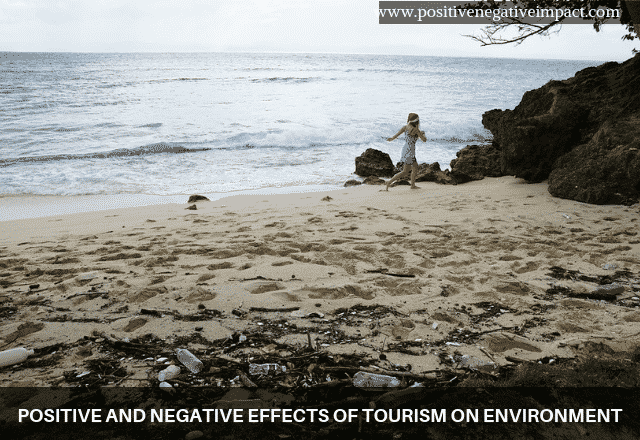Introduction
Tourism is regarded as one of the largest industries in the world. It even surpasses oil export industry, food industry and automobile industry. Inbound tourism contributes towards increasing the economic development of the country and create ample job opportunities too. On the other hand, outbound tourism is seen to promote cross-cultural goodwill and understanding. It is worldwide known that tourism is linked with the economic, intellectual and cultural aspects of a nation.
When seen in terms of environment, tourism industry has its own share of benefits and drawbacks. It positively forms social bonds and cultural identity of local people while causing a few qualitative and social reduction of a region. This leads to degradation in nature.

Positive effects of Tourism on Environment
- Tourism has been seen to encourage cultivation. It boosts sharing of local food, customs festivals and traditions.
- National parks and open spaces spread all across the country serves as a good way to replenish mind, body and soul.
- Tourism impacts nature in a positive way. Visiting new destinations impacts the minds of children. They learn to interact with “live” animals that they have only seen till date in television. Looking at the impressive landscapes and fields, they get a motivation to plant trees on their own. By observing wild ecosystems in its entirety, it makes them grow into an eco-conscious adult.
- Tourism, specifically ecotourism, assists in promoting peservation of wildlife. It plays an important role in conserving natural resources like rain forests that are regarded as a major tourism asset.
- Tourism assist in generating funds that helps in assuring proper and effective maintenance of marine parks and animal preserves.
- By generating alternate means of employment, it lessens problems related to deforestation and over-fishing in developing countries.
- In several destinations it has been seen that tourism assisted in ensuring effective protection of nature and higher water quality.
- It produces additional resources that helps in making investment in environmental services and infrastructures.
- Eco-tourism proves to be advantageous to local communities by providing them complete control over the way the tourism develops. It also assists locals to make efficient use of their resources and lands in a more maintainable way.
Negative effects of Tourism on Environment
Tourism begins to impact the environment in a negative way when the number of visitors who visits a tourist spot is succeeds the ability of environment to cope with their use. Uncontrolled tourism poses risks to several natural areas all across the world.
- It puts a lot of pressure on the land and results in increased pollution, harmful discharge of waste in the sea, soil erosion, increased pressure on rare species, natural habitat loss, and possibility of catching forest fires.
- Tourism often seen to put strain on one of the most major natural resources i.e., water. It forces locals to compete to obtain this critical resource that is already scarce. This adverse impact of tourism on environment is considerably large. It results in the exhaustion of natural resources, waste issues and pollution. The entire tourism industry overconsumes water resources in different ways like hotels, golf courses, swimming pools, and personal purpose by tourists. Unnecessary wastage of water results in its shortage, and rise in utility bills too.
- Tourism is also seen to result in huge stress on local use of land. It results in soil erosion, loss of natural habitat, increased pollution, and pressure on vanishing species. All these negative effects gradually harm the biological resources that forms the basis of the tourism industry.
- Tourism generally contributes towards more than five percentage of total emission of global greenhouse gas. Transportation is responsible for causing nearly ninety percentage of gas emission.
- Tourism also has the potential to create enormous pressure on local resources such as energy, raw materials and food, that are available in short supply. Greater transport and extraction of all these resources aggravates the physical effects linked with their misuse. Tourism puts a high demand on all these resources to fulfill the high expectations that tourists mostly have. These can be availability of hot water, warm room temperature, adequate heating, etc.).
- Key land resources such as fossil fuels, minerals, forests, fertile soil, wildlife and wetland are severely impacted by tourism. With increased recreational facilities and construction of tourism, the pressure is exerted on all the above stated scenic landscapes and land resources.
- Forests are seen to suffer a lot from the negative impact of tourism. Deforestation is often caused due to collection of wood for fuel production as well as land clearing.
- Tourism is also a significant reason behind pollution. Gas emissions, solid waste, littering, noise, oil, chemicals, architectural or visual pollution and releases of sewage, all leads to polluting the environment in so many ways.
In this way tourism impacts the environment in a positive and a negative way. It is required for the government to identify ways of workable tourism development to eliminate negative effects and promote the positive ones.
- Tulip Mania – The Story of One of History’s Worst Financial Bubbles - May 15, 2022
- The True Story of Rapunzel - February 22, 2022
- The Blue Fugates: A Kentucky Family Born with Blue Skin - August 17, 2021
